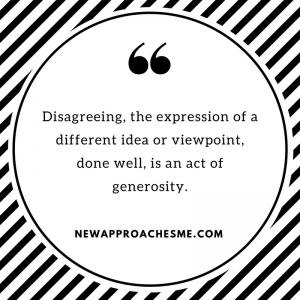 Being a therapist has taught me that to disagree effectively is to build connection and unity.
Being a therapist has taught me that to disagree effectively is to build connection and unity.
Talking in-depth for thousands of hours with dozens, if not hundreds, of people has had a profound impact on me. I am wiser, stronger, and happier than I would be otherwise, because I have connected with them and seen the world through their eyes.
I also feel more clear that everyone makes sense in the context of their lives. Most people are coming from a good place most of the time. People make choices that reflect their life experience, what they were taught, and what they value. These things vary dramatically person to person, naturally.
This seems obvious, but we see the world and speak from our own lens. Every single person has perspectives and internal narratives that are distorted, unhelpful, and just plain untrue.
There are no smart or dumb people. There are no good or evil people. There are people with differences, blindspots, and skewed realities. No one is immune to this, because we can’t completely step out of our bodies and our lives to see things with unbiased observations.
Our perspectives feel like reality when we only associate with people who are like-minded, consume media that reinforces our views, or simply don’t ever consider that there are other ways of seeing things.
But as my very sensible, fair-minded aunt says, “No matter how thin you slice it, there are always two sides.”
There is always another view. I think you should seek to know it, even if you never agree with it. I also believe you should share your views, at least the deepest, most important ones, without seeking to change anyone’s mind.
Disagreeing, the expression of a different idea or viewpoint, done well, is an act of generosity. It is offering up another way to see the world for others’ consideration. It’s not being disagreeable for sake of being a contrarian, it’s letting someone know your thoughts for the opportunity to expand and connect.
We are afraid of disagreements because we believe they inevitably cause disconnection and damage to relationships. This is a common but highly untrue myth.
Respectful disagreement actually brings people together. It connects people, not necessarily by building a consensus, but by showing how we all think and act in ways that reflect our lived experience. Opinions make sense when you hear how people have formed them, and we can see that this is almost never a malicious process. It is often a flawed process, but not an ill-intentioned one. We can come to know each other’s human experience, even if we still disagree with the perspective or opinion.
Talking about our values, perspectives, and strongly held thoughts, allows us to be heard and to process what we hear. Receiving feedback that our story is not how another sees things, gives us a chance to see things more clearly. We learn that we agree with many people on many things, even when some opinions and perspectives are different.
We think differently not because some of us are mean, bad, ignorant, or uncaring. We think differently because we are different. Some ideas are better than others. Some conclussions are better supported with evidence than others. But nobody is better or worse anyone else. We are people who can support each other’s growth by disagreeing respectfully.
Join me next time for tips on how to disagree effectively.
 Hannah Curtis is the founder of Effectively Frank™, a program that teaches the art of clearly and simply speaking your truth. Hannah believes we are all better people when we speak from a place of honesty and clarity. She runs a therapy private practice, New Approaches, in Portland, Maine. She is currently expanding her communication coaching offerings, contact her for more details: [email protected].
Hannah Curtis is the founder of Effectively Frank™, a program that teaches the art of clearly and simply speaking your truth. Hannah believes we are all better people when we speak from a place of honesty and clarity. She runs a therapy private practice, New Approaches, in Portland, Maine. She is currently expanding her communication coaching offerings, contact her for more details: [email protected].


0 Comments